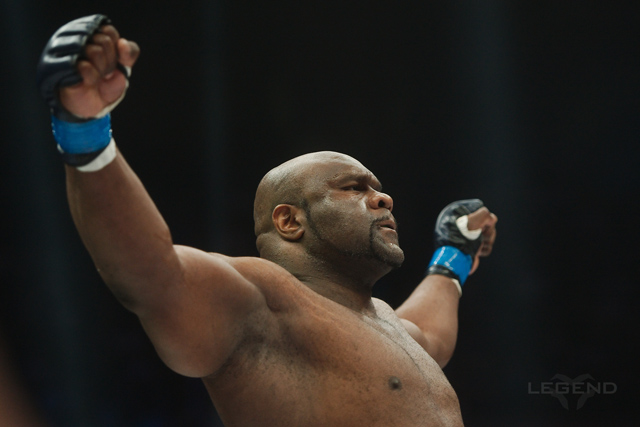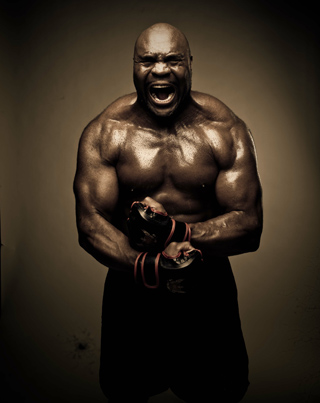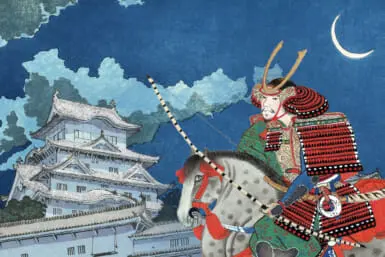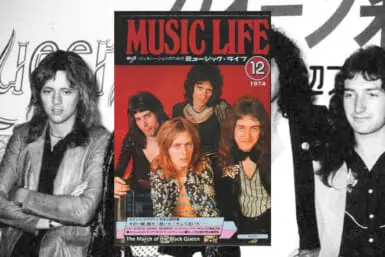You’d have thought that a fighter who’d barely won a bout in recent years would be struggling to get work. You certainly wouldn’t expect that person to be in demand, but Bob Sapp is not your typical fighter. The 6’5”, former American footballer is pure box office; an entertainer who still attracts huge crowds despite his poor recent record.
“It’s crazy,” he says. “Even though my results have been so bad, I’ve been getting more work than ever. I must be the only fighter than can go 0 for 15 and still sell out every venue. People write and ask, ‘why do fans still come and see you? Why do promoters still hire you?’ I say, ‘ask them.’ It’s easy to hire someone when they are winning; it’s much more difficult after so many losses.”
Sapp the person is not really any different to the celebrity you see on TV. Bold, brash, funny and extremely forthright, he’s a larger-than-life character who splits opinion like no other fighter. For some he is simply a comic figure who doesn’t take the sport seriously. Others, however, believe he is a breath of fresh air in an industry that often takes itself too seriously.
“People want to see an event,” Sapp tells us. “They don’t want to see 9–10 hours of fights between people they don’t know. They can see that on YouTube or on the streets. You want to get to know someone, get the entertainment value from it. That’s what combat sport is about. It’s not about people who show up and say nothing.”
The man nicknamed “The Beast” could never be accused of that, making sure he’s heard wherever he goes. During the hour-or-so we spent together at the Tokyo Dome Hotel he spoke candidly about his own career, making no attempt to hide the fact that he sees himself as “an entertainer first, fighter second.” He’s determined not to fall in to the same trap as many fighters, who he believes risk life and limb for little reward.
“Everyone takes different paths in life,” says the 40 year old. “For me it had to be financial stability first; then I could do what I wanted to do. The first thing for these guys is ego. They are happy being such great fighters. Cauliflower ears, messed up faces and for what? One more victory, another notch on your belt; well, you see where that gets you. I’m in the “accept” business, they are in the “fighting” business. If that is what they want to do then keep on fighting.”
“I am famous in America for being famous in Japan. People see me in the States and I think they might recognize me from the Longest Yard or something, but they’ll say that’s Bob Sapp, he’s huge in Japan.”
Sapp’s prepared to do what he is told as long as the money keeps rolling in, even if it leaves him with little time to properly prepare for matches. Between long-haul flights to various countries around the world, he is busy with commercials, TV appearances and numerous pachinko events. This year he has also been promoting the release of his autobiography, The Beast Bites Back, where he talks about how he has had to come to the aid of many fighters who couldn’t pay their bills.
He feels that people like Gary Goodridge, who suffered brain damage in the ring, have been let down by major fighting corporations and that a large number of fighters are being underpaid. According to a report on the MMA Manifesto website, the UFC’s top ten earners this year had all made well in excess of $500,000 by the end of October 2013. Sapp argues that the majority are getting nowhere near that amount.
“If people peeked behind the scenes they would be shocked,” he says. “The injuries, lack of medical attention, world-class fighters not knowing when their next pay packet is coming. This is the reality! These guys at UFC are supposed to be earning big bucks, yet you ask them and most are on under $30,000 a year, then you have to pay the manager, the trainer. How are you going to make any proper cash to do anything? Many are sharing a room with their corner man and flying economy. You think Manny Pacquiao is doing that?”
Sapp learned the hard way that nothing can be taken for granted in sport. His American football career was over almost as soon as it started. Released by the Chicago Bears not long after being drafted, he was then suspended by his next team, the Minnesota Vikings. With debt collectors on his back and his football career over, Sapp admitted to being in a “depressive state.” He had a brief stint in World Championship Wrestling (WCW), but then they soon went bankrupt.
At the turn of the century his luck started to change. While working odd jobs such as moving dead bodies to hospitals, Sapp got an offer to fight former Chicago Bear William “The Refrigerator” Perry in a tough-man competition. K1 founder Kazuyoshi Isshii was in attendance that night and evidently liked what he saw, inviting Sapp to fight in Japan.
“That changed my life more than I could’ve imagined,” Sapp says. “This is such a creative country that has allowed me to do all these crazy things. I am famous in America for being famous in Japan. People see me in the States and I think they might recognize me from the Longest Yard or something, but they’ll say that’s Bob Sapp, he’s huge in Japan.”
During those early years here, Sapp’s face was everywhere. A regular on TV shows and advertisements, his accessories, from little figures to vibrators, proved incredibly popular. Inside the ring things were also going well. He won 10 of his first 14 kickboxing fights and had a similar record in MMA. His most memorable victories came against four-time K1 World Champion, Ernesto Hoost, whom he defeated twice.
Unfortunately, those bouts are now a distant memory. He hasn’t won an MMA fight for more than three years, while his victory over Tofan Pirani in 2012 was his first in kickboxing for seven years. So what has happened to the man who beat Hoost twice and almost defeated legendary figure Antonio Rodrigo Nogueira?
According to his critics, he has simply stopped trying. James Thompson, who last year beat Sapp inside the first round, wrote a blog entitled “When a fighter gives up: A profile on Bob Sapp.” Announcer Ariel Helwani has been even more vociferous in his condemnation of “The Beast,” labeling him as a “mockery of the sport.” The former American footballer, however, believes both men are just trying to make names for themselves.
“You’ve got Thompson saying I’m addicted to fame, he is only saying these things because he wants to be famous. He’s hoping to make it difficult for people because it’s been so hard for him. He’s hardly made any money so you shouldn’t get any as well.
As for Helwani, he’s supposed to be UFC’s marketing guy, yet he’s on his show looking up Wikipedia on his iPad. Come on, the guy’s an idiot! He’s going around saying Bob’s throwing fights, then he has Mike Tyson on his show. Well in Mike’s last fight he sat down in the ring. So why is this guy so excited to have him on his program when he has allegedly done the same thing as me, making much more money doing it.”
At the height of his success there was talk of a fight between Sapp and Tyson, though because of the latter’s status as a convicted felon he couldn’t get a visa in Japan and the idea was eventually scrapped. It was disappointing for Sapp, who felt he felt he could’ve beaten him then, claiming that Tyson was “quite nervous.” A fight of that magnitude would have attracted huge viewing figures; possibly even bettering Sapp vs. Akebono, which was watched by an estimated 54 million.
He gets nothing like those numbers these days, yet remains one of the most popular and newsworthy fighters on the circuit. His alleged spat on Twitter with Tyson Fury in January, where the British heavyweight boxer appeared to call out the MMA star, made headlines. Sapp revealed to us that it was a 14-year-old boy who was writing under his name and that he was “rolling on the floor laughing” when he read the story on the Bleacher Report.
Serious fighting fans may get annoyed seeing him constantly in the news while better prepared, more skillful athletes get little attention, yet the fact is sponsors see something in him and that’s why he continues to get top billing. Until that changes, the man known as “The Beast” will carry on, knowing that while the ridicule and criticism gets louder, his bank account gets bigger.










